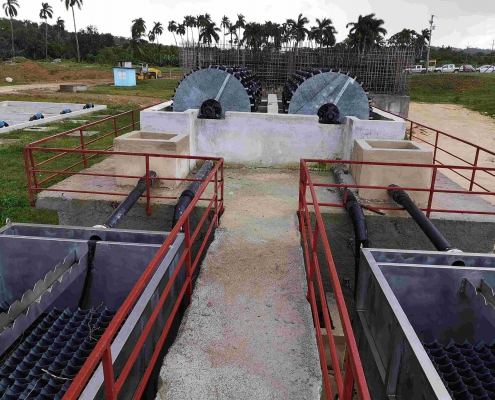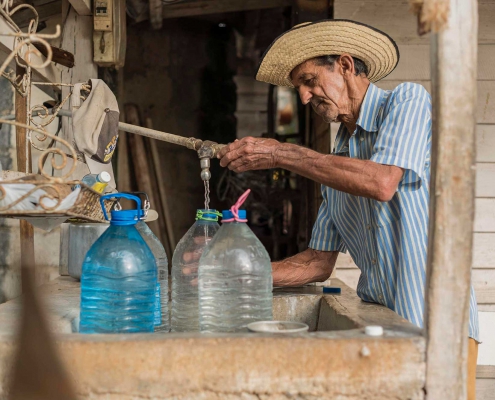Cuba

Although data shows that access to water and sanitation in the country exceeds 90%, there are still some significant challenges in terms of service quality and infrastructure renewal.
The Cooperation Fund for Water and Sanitation has two lines of action: on the one hand, to promote drinking water services in intermediate cities in various provinces of the country and, on the other, to improve water quality in the Bay of Havana through the construction of wastewater treatment plants in several areas around the city. To this end, work is being carried out with the National Institute of Hydraulic Resources (INRH), the governing body for water and sanitation in Cuba, and with the Havana Bay State Working Group (GTE-BH), an autonomous body under the Ministry of Environment in Cuba.
The FCAS is currently running three programmes in the country, two of which are currently scheduled to end in December 2021.
The CUB-004-B programme, worth 15.5 million euros, 4.5 million euros of which are donations from Spain, aims to expand and improve drinking water supply systems in six cities throughout the country. Specifically, this programme will bring three new water treatment plants into operation and rehabilitate two others that were in very poor structural condition. In addition, main and secondary networks and household connections will be installed, enabling 87,000 people to have access to safe drinking water.
As for the CUB-003-B programme, worth 2.8 million euros, its main objective is the construction and commissioning of three new urban waste water treatment plants in the country’s capital. Due to the difficulties in creating the Monterrey plant project, it was decided to replace it with a series of actions aimed at optimising Havana’s central sanitation system. Among the new actions are the rehabilitation of the city’s main wastewater pumping station (Casablanca), as well as other secondary pumping stations and improvements to the sewerage system’s collectors, which serves a daily population of more than 860,000 people.
In November 2020, and once all the regulatory and operational documents required to start the programme had been finalised, implementation of the CUB-005-B programme (0.65 million euros) began. This programme, which complements CUB-004-B, aims to rehabilitate and build new water supply infrastructure (drinking water treatment plants, pumping stations and networks) to supply quality water to the villages of Marcané and Alto Cedro, both in the municipality of Cueto. The programme also includes the rehabilitation of the headwater tank in the town of La Palma, a key element in the supply system of this town, which will allow the system to be managed more efficiently and ensure a more stable service to the population.
More information

Both the CUB-004-B and CUB-003-B programmes, which were already progressing very slowly due to the fuel shortage suffered during 2019, were affected by the Covid-19 pandemic. In both programmes there are critical pathways: with regards to the first programme, the completion of the civil works and commissioning of the Cueto water treatment plant and, the second, the acquisition, installation and commissioning of all the technological equipment aimed at improving the central sanitation system in Havana. Apart from these actions, the rest of the works and infrastructures are expected to be completed and put into operation throughout 2021.
In addition to the aforementioned programmes, the FCAS also supports the development of two other bilateral technical cooperation programmes that AECID has been implementing in Cuba since the end of 2019 with the same local partners. There is a combined budget of approximately one million euros for these programmes which, although not directly financed by the FCAS, have an impact on the water and sanitation sector and are complementary to the operations of the Water Fund and promote its sustainability.
The programme implemented with INRH is aimed at strengthening the water management capacities of Cuban institutions through training and technical and knowledge exchange between professionals linked to the sector. Work is being carried out in several areas such as the review and updating of the sector’s regulatory framework, the development of the sanitation master plan for the province of Havana, and the training of various water and sanitation service operators at the municipal level with the aim of optimising the services they provide to their local communities. Finally, the programme implemented with the GTE-BH involves the training and technical exchange of professionals working in the industrial sector with the aim of obtaining viable projects for wastewater treatment plants for some of the industries that operate in the Havana Bay basin and discharge their wastewater into the basin.
These bilateral programmes have opened up new areas of collaboration to improve and strengthen the technical and management capacities of Cuban government institutions with competencies in the national water sector. However, little progress has been made in 2020 with these two initiatives as it has not been possible to implement the planned face-to-face visits to develop these knowledge exchanges, although digital channels have been used as much as possible.

